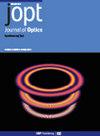Multifunctional beam modulation based on gratings combined with additive metasurfaces
IF 2.7
4区 物理与天体物理
Q3 OPTICS
引用次数: 0
Abstract
A design scheme combining grating and element additive metasurface is proposed in this paper. Multi-dimensional joint control of the phase, amplitude, angle and polarization and multi-functional integrated metasurface applications were realized by using the inherent characteristics of the light wave properties (polarization and wavelength). Firstly, suitable structural parameters are obtained based on the reflection response of the unit structure, and a 2-bit encoded metasurface array is constructed by utilizing the combinatorial operation between the unit structure. Combined with the polarization selectivity of the lower grating, the dual-function integration of asymmetric transmission (the contrast ratio is 98%) and abnormal reflections (operating bandwidth is 300 nm) was realized. Next, two new half-wave plates were obtained by addition and rotating the elemental structure, and the polarization conversion efficiency of 95%–97% was achieved thanks to the Fabry–Perot cavity formed by the upper metasurface and lower grating. Finally, encoded metasurface based on the geometric phase principle to achieve 300 nm bandwidth cross-polarized wave deflection characteristics with polarization conversion efficiency close to 100%. Our work combines grating structures with element additive metasurfaces, which solves the problem that element structure needs to be redesigned with the change of function, and also paves the way for the application of multifunctional integrated metasurfaces in optical sensing, optical imaging and other fields.基于光栅与添加式元表面相结合的多功能光束调制技术
本文提出了一种结合光栅和元素添加元表面的设计方案。利用光波的固有特性(偏振和波长),实现了相位、振幅、角度和偏振的多维联合控制和多功能集成元表面应用。首先,根据单元结构的反射响应获得合适的结构参数,并利用单元结构之间的组合运算构建 2 位编码元表面阵列。结合下部光栅的偏振选择性,实现了非对称透射(对比度为 98%)和异常反射(工作带宽为 300 nm)的双功能集成。接着,通过添加和旋转元素结构获得了两个新的半波板,并利用上元表面和下光栅形成的法布里-珀罗腔实现了 95%-97% 的偏振转换效率。最后,基于几何相位原理的编码元面实现了 300 nm 带宽的交叉偏振波偏转特性,偏振转换效率接近 100%。我们的工作将光栅结构与元件添加式元表面相结合,解决了元件结构需要随功能变化而重新设计的问题,也为多功能集成元表面在光学传感、光学成像等领域的应用铺平了道路。
本文章由计算机程序翻译,如有差异,请以英文原文为准。
求助全文
约1分钟内获得全文
求助全文
来源期刊

Journal of Optics
OPTICS-
CiteScore
4.50
自引率
4.80%
发文量
237
审稿时长
1.9 months
期刊介绍:
Journal of Optics publishes new experimental and theoretical research across all areas of pure and applied optics, both modern and classical. Research areas are categorised as:
Nanophotonics and plasmonics
Metamaterials and structured photonic materials
Quantum photonics
Biophotonics
Light-matter interactions
Nonlinear and ultrafast optics
Propagation, diffraction and scattering
Optical communication
Integrated optics
Photovoltaics and energy harvesting
We discourage incremental advances, purely numerical simulations without any validation, or research without a strong optics advance, e.g. computer algorithms applied to optical and imaging processes, equipment designs or material fabrication.
 求助内容:
求助内容: 应助结果提醒方式:
应助结果提醒方式:


